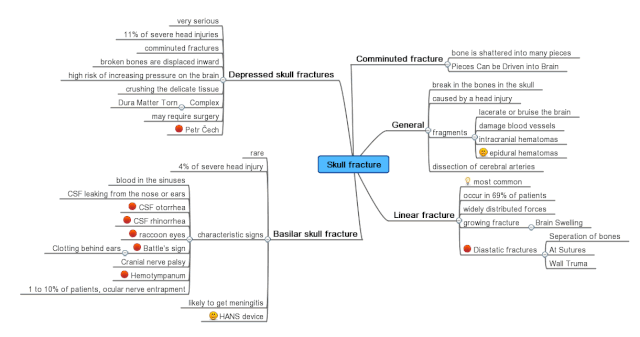
Mind maps are a very useful study tool. They help generate, visualise and structure your ideas and help plan how you write for essays and prepare for exams. Mind maps usually begin with a central topic – this could be your essay title. You then add subtopics that can be ideas or concepts that relate to this central topic.
Imagine you were writing an essay on the British Media. This would be your central topic. Subtopics might include newspapers, radio, television, etc. And these themselves are topics that can be further subdivided, e.g. newspapers into tabloid/broadsheet, then individual titles. You could finish with several subdivisions of your original topic. The more you brainstorm, the more ideas you’ll have to work with before you write. It works for exams too. Studies have shown that memory recall is improved by using mind maps.
There is lots of software available that will generate mind maps for you from your ideas – these will look clearer and more structured than hand-written notes, and can be fun to use. Here are some examples.
Coggle requires a Google account, but otherwise there is no software to download. It’s simple and self-explanatory to use and you can create and complete maps within minutes. Maps can be saved to Coggle, shared with others (either by using the link for the map or inviting users) or downloaded (JPG/PDF).
See an example here.
Bubbl.us requires you to create an account, but like Coggle, there’s nothing to download. ‘Start brainstorming’ to create your map. Again, it’s a simple tool, but does allow you to tweak sizes/colours of topics/subtopics to stress their significance. Your maps are saved to Bubbl.us and you can access them any time. You can print your map or save as a JPG.
Xmind is much more professional mind mapping software. You can download a basic version for free, though it lacks the sophistication of the paid-for versions. Still, it allows you to create effective maps. It provides templates if you want to create maps in a given style. If you use the free version you can print your map but you can’t export it.
Visuwords is an online graphical dictionary. Unlike dictionaries that define words, this also shows the relationship between your word and associated words and concepts, so you learn how words associate. It works best with general terms, e.g. Psychology, than very specific terms, e.g. Freudian, but it’s still worth using.
Leave a Reply